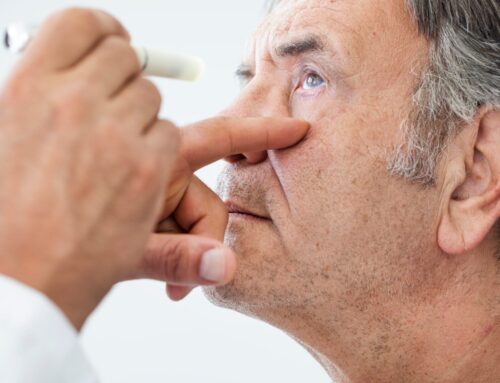
Smoking and cataracts
Around 6.6 million UK adults smoke. Although this is the lowest number since records began in 2011, millions of people are damaging their health daily. We know smoking harms our health in many ways, including causing cancer. But did you know it can also affect eye conditions like cataracts?
Discover the connection between smoking and cataracts and how it affects your eye health with Eye Clinic London.
The effects of smoking on cataracts
Cataracts are widespread, with over 400,000 cataract surgeries completed in the UK every year. If left untreated, the eye condition could significantly affect your vision and cause blurring and clouding.
Smoking is a considerable risk factor in forming cataracts. You do not have to smoke yourself. Second-hand cigarette smoke in your eyes has a toxic effect on your retina. Damage from smoking can increase your risk of developing cataracts.
Although age and genetic predisposition are the main risk factors for developing cataracts, research confirms that smoking has a direct effect. A 2005 study found a causal link between smoking and the risk of cataracts. Another study found a relationship between exposure to certain substances in cigarettes and changes to the body that increase the risk of cataracts developing.
When you smoke, you introduce free radicals — unstable molecules that can damage cells — into the body. These molecules cause oxidative stress and damage when the production of free radicals and your body’s ability to neutralise them become imbalanced.
Your eye’s lens is more susceptible to oxidative stress because it is frequently exposed to light and has high metabolic activity (which means it uses a lot of energy). The results cloud your lens and the development or worsening of cataracts.
Smoking can also trigger inflammation within your body, including your eyes. When inflammation happens, the proteins in your eye’s lens begin to break down, contributing to cataracts developing or worsening.
We do not entirely understand why smoking can cause cataracts, but these studies suggest a direct link between the two. One hypothesis is that smoking destroys antioxidant nutrients within your eye, damaging the lens and causing cataracts.
Smoking can also restrict blood flow in your eye, depriving it of oxygen and potentially causing tissue death. Again, this damage can lead to cataracts.
The impact smoking has on your eye health
The toxins in and smoke from cigarettes can affect your overall eye health. We know they can impact different eye conditions and exacerbate pre-existing ones.
Some common eye conditions that smoking can cause or worsen include the following:
- Macular degeneration
- Dry eye
- Diabetic retinopathy
- Uveitis
- Optic neuropathy
- Retinal vascular diseases, such as retinal artery or vein occlusion
The harmful substances in cigarettes and smoke damage your ocular tissues and restrict blood flow. Eventually, this damage and blood flow restriction can worsen conditions like the ones above.
Preventing cataracts
Although some people have a genetic predisposition to cataracts, quitting smoking can decrease your risk of developing them. Ditching cigarettes will help to lower the amount of oxidative stress in your eyes and reduce inflammation and exposure to toxic chemicals.
By giving up smoking, you can reduce your risk of developing cataracts and other conditions that markedly affect your health.
The following healthy lifestyle choices can also reduce your risk of cataracts:
- Wearing ultraviolet protective sunglasses
- Maintaining a healthy weight through diet and exercise
- Eating a well-balanced, nutritious diet
- Reducing or limiting your alcohol intake
- Having regular eye check-ups to keep your eye health
- Staying hydrated — drinking enough water hydrates your eyes, including your lens and helps the lens to filter out toxins and maintain clarity.
Leading a healthy lifestyle and caring for your eyes can significantly reduce your risk of cataracts. It is not always possible to prevent them entirely, but you could lower your chances of developing them, even with unavoidable risk factors, such as a genetic predisposition.
Cataract surgery: what is it?
Thankfully, we can treat cataracts, and the best solution is cataract surgery. The procedure involves removing the clouded lens. The surgeon then replaces it with an artificial lens to restore your vision and prevent cataracts from returning.
Cataract surgery is a minor outpatient procedure, which means you can go home on the same day.
Before the operation, your consultant will assess you to ensure surgery is the right option. Cataracts often do not need removing unless they severely affect your daily life. You must arrange for someone to drive you home as your vision will be blurry after surgery.
Recovering from cataract surgery is pretty straightforward, but you must follow post-operative aftercare instructions carefully. After surgery, it’s normal for your eyes to feel itchy or gritty. We will give you eye drops to keep your eyes lubricated and infection-free. You may feel some mild pain but can alleviate it with over-the-counter pain relief.
During your recovery from cataract surgery, you must avoid the following activities:
- Swimming
- Driving
- Strenuous exercise and actions
- Touching or rubbing your eyes
- Using a hot tub or a sauna
- Wearing eye make-up
You should recover in around one week if you adhere to your post-operative advice and no complications arise.
Cataract surgery is a highly successful procedure that helps you get back to what you love.
Book a consultation with Eye Clinic London
We can’t always prevent cataracts, but giving up smoking can reduce your risk. Caring for your eye health is essential and if you develop cataracts, we are here to support you.
Eye Clinic London’s specialist team of ophthalmologists can help restore your vision with our highly successful cataract surgery. Book your consultation today and put your eye health in expert hands.
Sources
- https://www.ncbi.nlm.nih.gov/pmc/articles/PMC1857475/
- https://pubmed.ncbi.nlm.nih.gov/27512384/
- https://pubmed.ncbi.nlm.nih.gov/16304587/
- https://www.ncbi.nlm.nih.gov/pmc/articles/PMC9556318/
- https://www.nei.nih.gov/learn-about-eye-health/eye-conditions-and-diseases/cataracts/cataract-surgery

About the expert
Mr Hamada | Consultant Ophthalmologist and Corneal Surgeon
MD, MSc, DO (hons), FRCSEd, FRCOphth I am Samer, founder and consultant ophthalmic surgeon with over 20 years’ experience in ophthalmology. I am a world-renowned specialist in cornea, cataract and refractive surgery. I’m not only a leading surgeon but also the only dual fellowship trained in corneal diseases in children from reputable institutions in the UK. At Eye Clinic London I work closely with other consultant ophthalmologists, optometrists and orthoptists to achieve the best outcomes for our patients. Our main aim is to make sure our patients get the safest and best treatments available to them. We put your safety before anything else so you can rest assured that if you choose us you will be in the best and safest hands.



